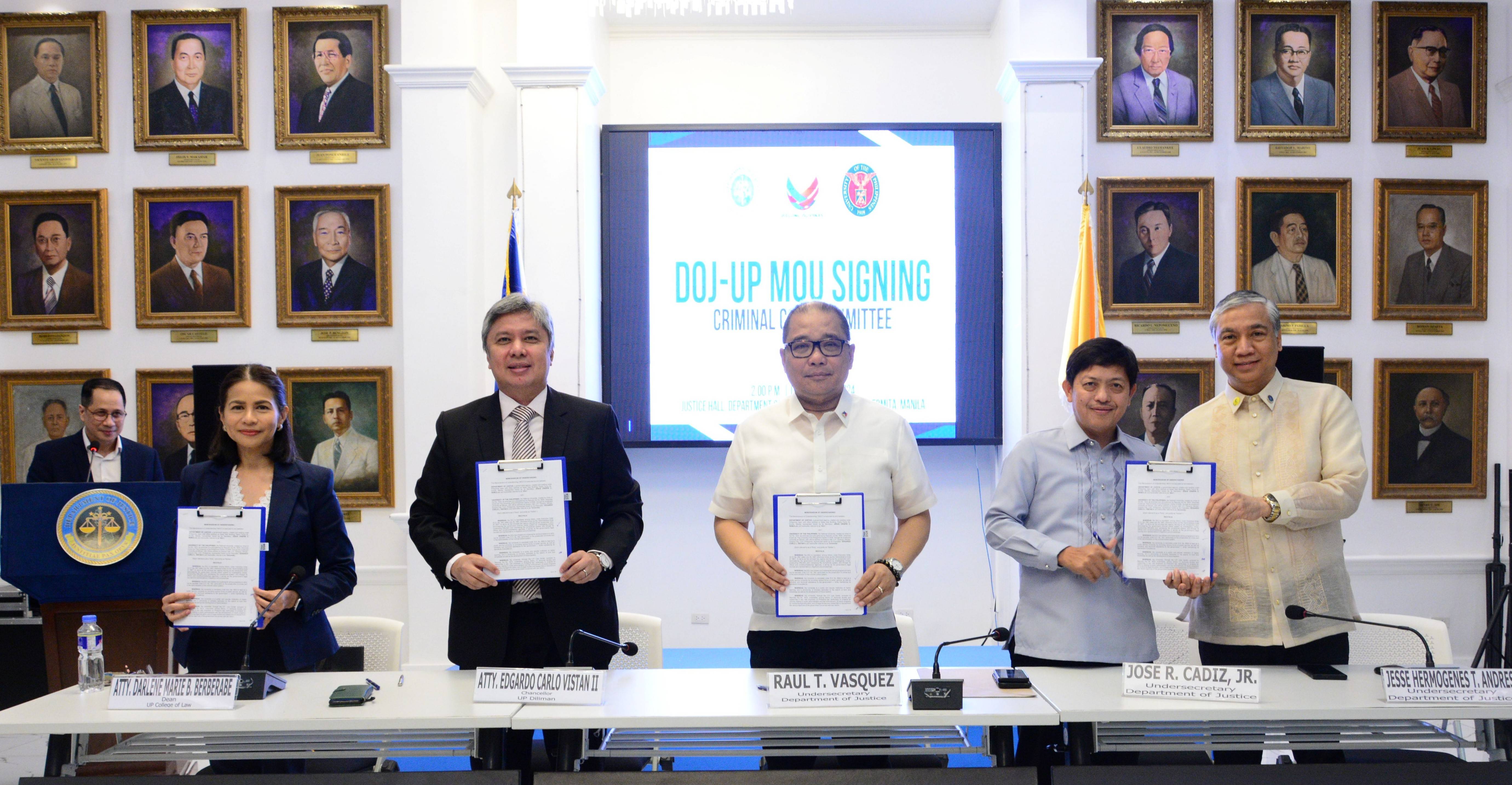DOJ, UP tie up for Criminal Code

The Department of Justice (DOJ) and the University of the Philippines have signed a memorandum of understanding (MOU) to revitalize the Criminal Code of the Philippines, the agency said Wednesday.
The MOU was signed by Criminal Code Committee (CCC) chairman and Justice Undersecretary Raul Vasquez, CCC co-chair Jose Cadiz Jr., Justice Undersecretary Jesse Andres, and UP Diliman Chancellor Edgardo Carlo Vistan.
It was witnessed by UP College of Law Dean Darlene Marie Berberabe.
"We wish to create a new penal code that not only reflects current values and conditions but also respects rights inherent to us all as human beings," Vasquez said.
For his part, Andres said they are seeking to improve access to justice through the new code.
"We are trying to achieve one document that will contain in organized code everything. In one document. So you can imagine that people now will have better chances of learning what is the existing law because it is now found in one document," Andres said.
Under the MOU, the DOJ will share data, attribute intellectual property, and recognize UP as its official partner in research and capacity building activities.
The department will also provide the resources for its implementation.
Meanwhile, UP must undertake the activities under the MOU, as well as provide reference materials, resource persons, and research studies. It must also cooperate with the activities of the DOJ.
“It's about time that we put in our resources, rationalize and reconcile our work and eventually make our criminal laws understandable and accessible not only to lawyers," Vistan said.
According to Vasquez, it is "high time" that issues on the criminal code are addressed.
"Adultery at saka concubinage. It's high time na i-address natin 'yung mga issues na 'yan (that these issues are addressed)," Vasquez said.
"Kailangan natin i-akma itong mga batas na ito na dati-dati ay based sa societal and cultural values. Kagaya ng sinabi ni Chancellor kanina na kailangan ito ay akma sa societal, legal, technological advancement or status... at saka 'yung religious as well as moral values natin," he said.
(We need to update these laws that were previously based on societal and cultural values. Like what the Chancellor said earlier, this must be up to date with our societal, legal, technological advancement or status... and our religious and moral values.)
He said they must also remove outdated laws from the Revised Penal Code.
“Number one, dueling. Wala nang nagdu-duel dito. Pangalawa, 'yung theft [of] coconuts. Hindi ninyo alam siguro magnakaw ka ng isa o dalawang buko lamang sa isang coconut plantation 'yan ay qualified theft,” Vasquez said.
(Number one, dueling. No one duels anymore. Second, the theft of coconuts. You may not know but stealing one or two coconuts from a coconut plantation is already qualified theft.)
According to Vasquez, this may be classified as simple theft instead of qualified theft.
“Pag qualified kasi, ‘yan ay walang piyansa. And ang approach na ngayon ng ating mga batas ay towards more on protection and promotion of human rights. Right to liberty is paramount,” he said.
(If it is qualified theft, there’s no bail. Our approach to laws now is more toward the protection and promotion of human rights. Right to liberty is paramount.)
“So between two pieces of coconuts as against liberty mo, natural, bibigyan mo pagkakataon ‘yung isang tao,” he added.—AOL, GMA Integrated News




